
The Italian Archie
by ALEX CARNEVALE
James Ivory's The Golden Bowl begins with two lovers in the ruins of Rome, explaining why they can't be together. The woman Charlotte (Uma Thurman) has no money. Neither does the man, native to Rome Amerigo (Jeremy Northam). So it is concluded they cannot really be together, despite the exquisite image of their bodies pressed against one another.
A few years later, the man marries Charlotte's girlhood friend Maggie (Kate Beckinsale). This is not in itself a tragedy. The new woman is warm and loving, her father is loaded with cash he plans to spend on building a museum on the Upper East Side of New York City. Amerigo is ostensibly happy with his new arrangement, but then Charlotte appears in his life again in time for his wedding to Maggie.
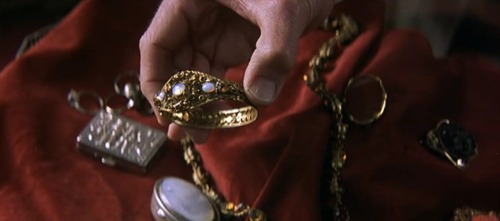
Early in The Golden Bowl, Charlotte and Amerigo go shopping for a wedding gift for the latter's fiancee. They visit a jewelry store where they see the eponymous Golden Bowl. Charlotte appraises the rest of the collection and pronounces the verdict, whether out of malice or good sense: "There is nothing here that she could wear." The two quarrel about the collapse of their previous relationship. Over time, Charlotte becomes engaged to Maggie's overbearing father. Charlotte and Amerigo then consummate their relationship on the sly.
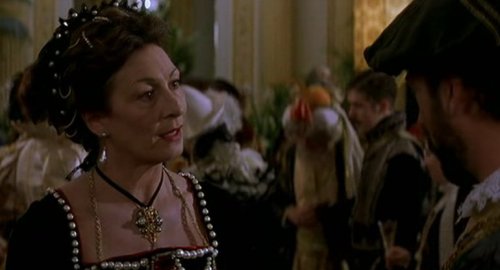
Adultery is tricky business in the cinema. The male adulterer is rarely approved of. He is largely given a bad rap; he sometimes hurts Richard Gere's feelings. Charlotte's portrayal is no better. Such drama is the kind of illusion only important to the rich. Perhaps the relative economic status of these individuals is immaterial, but as they stroll casually through an epic mansion, their concerns seem less important than the decor. The once-deprived Amerigo stands at attention to the splendor of the other creatures whose world he inhabits. For him, the only real world is Rome. He is always trying to go back there.

Cheating on someone seems exciting, for awhile. Cheating on your wife with her father's wife, even more so. The excitement thus heightened, Amerigo's swarthy attentions are naturally paid to his vivacious blond former lover rather than his brunette wife who so recently, we suspect, had breast enhancement surgery. Such were the strange vicissitudes of life around the turn of the century.

Banging your wife's father's wife is known in some circles as the reverse Oedipus; in other circles it invariably results in a Cleveland Steamer and the severing of all concurrent relationships. Our families naturally become closer together in affluence, and such implausibilities are rapidly rendered most plausible.

Looked at from the other perspective, it is still harder to merit sympathies for the victims of such Biblical indiscretions. Maggie is a naïve imp; she cares for Amerigo's child from a previous whatever with all the aplomb we expect from how the wealthy tolerate weaknesses in the less fortunate. If the would-be victim is already vulnerable, aren't they asking to be taken advantage of?
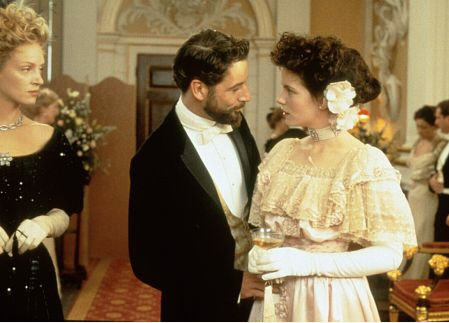
Anjelica Huston plays the original matchmaker of Maggie and Amerigo, Fanny. No one better channels the way a segment of yourself disappears by how you behave than Huston when she practices her craft. Having set up Maggie and Amerigo, Anjelica's Fanny feels great guilt, even harassing Amerigo when he risks appearing with Charlotte in public: "I have noticed before with you that you like having a thing without liking to call it by its name."

Despite disapproval from such quarters, Amerigo carries on his affair. Naturally, the possibility of love within other love excites him. It excites every man with blood flowing towards his penis. Amerigo becomes the victim of these two feminine ideals. Henry James essentially told us about the first Archie.

Uma Thurman or Charlotte or whatever you insist on calling her, is the escape. Amerigo met a woman who freed him from an entire part of his self-possession. There are reasons, in themselves, to disregard everything you know.
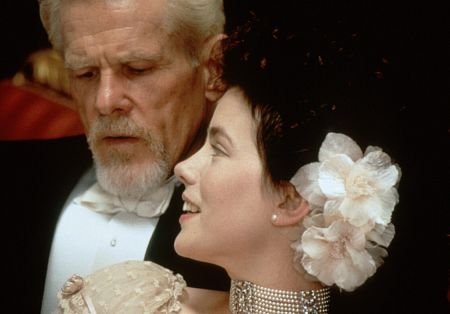
Kate Beckinsale or Molly McAleer or Maggie is the darker, more intensive brew. (Brunettes are always symbols for something or other.) From the moment you start dating her, you have to be good with the idea you will appear in every page of her personal journal, that she will take everything from you and spit out whatever doesn't make sense or reconfirm her view of the world. Such paramours are usually either a tremendous disappointment or the love of your life.

Despite having two female protagonists, emanating from the approximate direction of The Golden Bowl is a rare misogyny. Someone once called a friend of mine a literary misogynist, but this wasn't quite true. The real adulterer is not a misogynist or hypocrite, for he does not pretend to offer any of the comforts of a lover; he manages the abandonment of those comforts. When you find a woman willing to give that up, you can hardly blame the man involved.
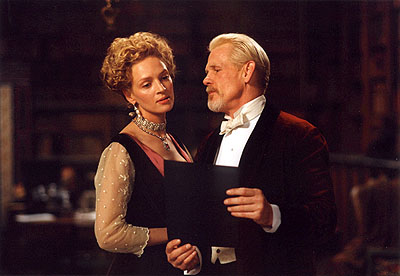
The relationship between Charlotte and Nick Nolte's Adam Verver is the most fascinating of those in The Golden Bowl. We all wonder at how relationships begun under shaky premises evolve and develop. Charlotte has no love for Adam; she disdains his museum, she finds his art collecting eccentric in a fashion that deliberately takes attention away from her. In time, they move closer together, eventually becoming intimate. In this case the American identity, in photos and film, the art forms themselves, repossess the people they represent.

This is The Golden Bowl's way of suggesting that all love deserves a context. Everything deserves a context, argued James in every line of his extant prose. His mastery was in making the unappealing overly appealing, and then switching it around again. He was never afraid to push people towards each other, even in hatred, to see how the rest of the world was accommodated by the result.
Alex Carnevale is the editor of This Recording. He is a writer living in New York. He tumbls here and twitters here.

"Simple Line of Decline" - For Love Not Lisa (mp3)
"Travis Hoffmann" - For Love Not Lisa (mp3)
"Traces" - For Love Not Lisa (mp3)
